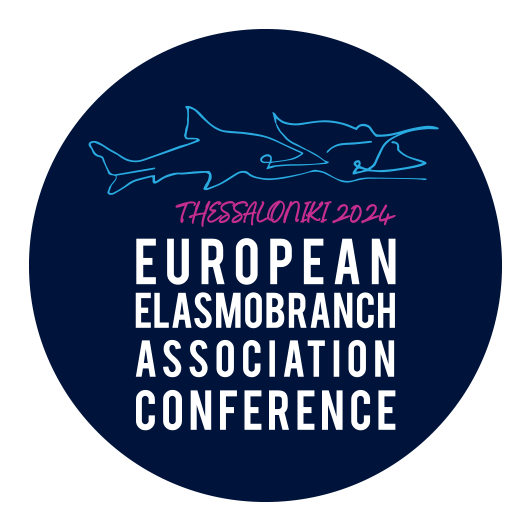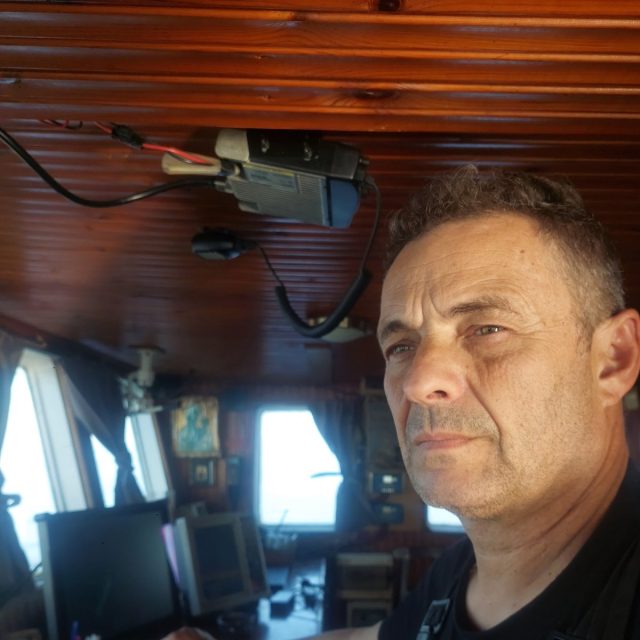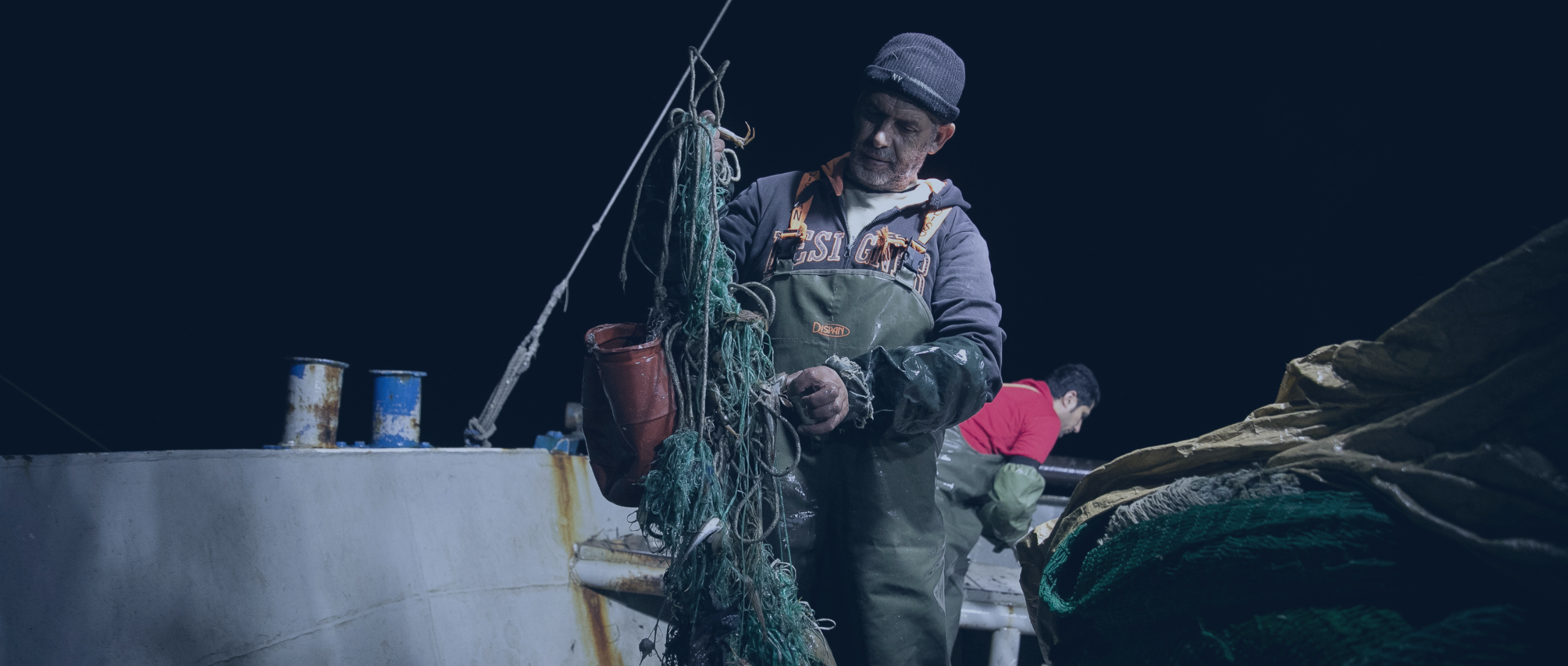
The Fishing for Litter project of the Athanasios C. Laskaridis Charitable Foundation promotes the participation of the fishing industry in the reduction and monitoring of benthic waste based on the OSPAR Agreement 2017-018 protocol.
In collaboration with the environmental organisation iSea, participating professional fishers are asked to collect marine litter that accumulates in their nets as part of their normal fishing activity and record it based on a protocol adapted for this purpose. This waste is then delivered to the available port facilities.
The main objectives of the project are to raise awareness within the fishing industry and change their waste management practices, to remove marine litter, and to collect data during commercial fishing activities.
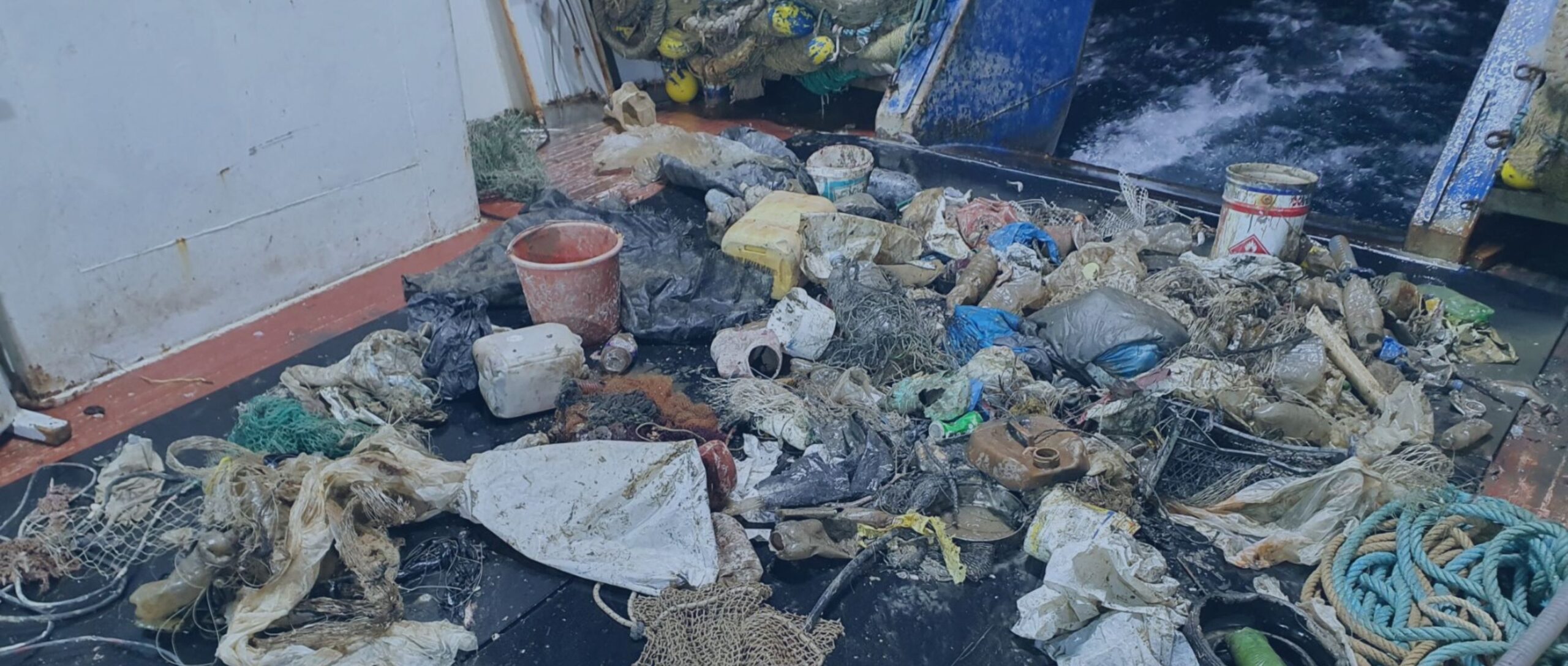
The implementation of Fishing for Litter is an important measure for the removal of litter from the seabed, but also one of the few available ways of systematic and long-term monitoring of benthic litter at great depths. At the same time, the data collected contribute to the implementation of the Maritime Strategy Framework Directive (2008/56/EC).
In total as part of the project, since October 2019, more than 186 tons of litter have been removed and more than 311,032 items have been recorded by the fishers themselves. In 2019, from October to December, Fishing For Litter was piloted in the ports of Nea Michaniona and Kavala while currently 48 fishing vessels participate from the ports of Nea Michaniona, Thessaloniki, Kavala, Alexandroupoli, Samothrace, Porto Lagos, Stavros Thessaloniki, Volos, Petra (Lesvos), Perama (Lesvos), of Mytilene, Chios, Mesta (Chios), Vathi (Samos), Patmos, Leros, Skiathos, Lemnos, Kalymnos, Chania, Patras, Kyllini and Agios Nikolaos Crete.
Find the project's reports below:
Project's Ambassadors

Ilias Hatzigavriil
Mr Ilias Hatzigavriil is of the fishers that are part of the “Fishing for Litter” program that takes action in the Northeastern Aegean. He’s 48 years old and he professionally started to be involved in fishing im 1988, at the age of 14, as this was his father’s profession.
R: How many years have you worked as a fisherman? How did your occupation with fishing begin?
IH: I’ve been working as a fisherman since 1988. At the time, I was 14 years old and it was my father’s profession.
R: Could you describe a day in the sea?
HX: There are calmer days, that aren’t that interesting and there are really good ones, that are fewer. The procedure generally is monotonous, but there are some amusing days that keep me alert. Whenever I’m in an area that is more demanding, it requires more effort but keeps me on my toes. While in multiday fishing efforts, there’s a lot of standing and fatigue.
R: What differences do you notice regarding the amount of waste compared to the past?
IH: In general, there is an increase of waste, but it does not apply to all types of waste. For example, nets and fishing gear remain in equivalent quantities, while plastic items and especially plastic bags and styrofoam, have increased considerably.
R: What kind of waste you’ve collected has made the biggest impression on you?
IH: Fragments of an airplane.
R: What does the sea and its protection mean to you?
IX: The sea means the world to me. I’ve spent a really big part of my life in it. The protection of the sea is a mentality type of thing. People were making more mistakes in the past but nowadays, people have learned to respect it.
R: What is the message you want to pass along the world?
IH: The sea can heal, as long as we can understand it.
iSea’s «Fishing For Litter» program is implemented for 6 years in a row, in lots of different areas in Greece, in collaboration with the A C Laskaridis Charitable Foundation. The ambassadors of this program, the professional fishermen who actively support the effort of collecting and recording aquatic litter from the sea all over the country, talk about the nature of their profession and share their experience and thoughts about the program.
We would like to thank all the fishermen who cooperated with us, for a more effective implementation of the “Fishing For Litter” program and give a personal touch to this effort.

Nikos Stratos
Mr Nikos Stratos is is one of the fishers that are part of the “Fishing for Litter” program that takes action in the Northeastern Aegean and more specifically in Thermaikos and Evian Gulf. He’s 39 years old and started he’s occupation with fishing by following his grandfathers work path.
R: How many years have you worked as a fisherman? How did your occupation with fishing begin?
NS: I started professionally fishing at 1998. My grandfather got his first motor trawler at 1963. Currently, we are working with the 4th boat of the family.
R: Could you describe a day in the sea?
NS: Work never stops, the boat is sailed by my brother and me, so the responsibilities alternate. Our basic hopes for the day are to get good fish and then have luck in the market. One of the things that has been stressing us lately is the crisis of the season and the price of oil. Time on board is spent in between video calls with family and also, constant daily communication with colleagues in order to share information and stay updated about the sea. One of the things that gives me joy is that I enjoy working with a new boat because it makes me fell like my job is also my hobby.
R: What differences do you notice regarding the amount of waste compared to the past?
NS: We always picked up litter. We have noticed a lot of fishing ropes and many plastic bags that make our job even harder because they clog fishing nets and trap small fish inside.
R: What kind of waste you’ve collected has made the biggest impression on you?
NS: A “Reo”, which is a military truck from war that we found and transfered to the coast.
R: What does the sea and its protection mean to you?
NS: Health comes first and then the sea, that’s how important it is to us. Its protection is vital in every aspect, from the aspect of fish stock as well as pollution.
R: What is the message you want to pass along the world?
NS: Stop polluting the sea and the coast with litter.
iSea’s «Fishing For Litter» program is implemented for 6 years in a row, in lots of different areas in Greece, in collaboration with the A C Laskaridis Charitable Foundation. The ambassadors of this program, the professional fishermen who actively support the effort of collecting and recording aquatic litter from the sea all over the country, talk about the nature of their profession and share their experience and thoughts about the program.
We would like to thank all the fishermen who cooperated with us, for a more effective implementation of the “Fishing For Litter” program and give a personal touch to this effort.

Stelios Fyrbas
Mr Stelios Fyrbas is one of the fishers that are part of the “Fishing for Litter” program that takes action in many greek areas, such as Cretan Sea, the Cyclades, the North Aegean and the Argolic Gulf. Fishing is a family thing, due to the professional occupation of his father and his grandfather.
R: How many years have you worked as a fisherman? How did your occupation with fishing begin?
SF: I was always around sea and fishing since both my faher and grandfather were fishermen. I started working part- time along with my family at the age of 17 and at dedicated myself to it at the age of 25.
R: Could you describe a day in the sea?
SF: A bad day at work in adverse weather conditions that can last for the entire day, is a tiring and dangerous condition. Bad days are also days without fish and the combination of bad weather and lack of fish is the most futile condition. On the other hand, a beautiful day at sea begins with dead calm. Facing the deep blue, dawn and sunset on such days is a unique feeling. Another great feeling is the day after the bad ones that you get a lot of fish!
R: What differences do you notice regarding the amount of waste compared to the past?
SF: The sea is hiding a lot of waste. The aquatic litter might have decreased but that also depends on the weather conditions such as rain that reveals more waste than someone can see on a calm day.
R: What kind of waste you’ve collected has made the biggest impression on you?
SF: Some of the things that made a big impression on me are pieces of boats, beach chairs, children’s dolls and big pieces of grease that look like some type of gel.
R: What does the sea and its protection mean to you?
SF: The sea is a magical place. The people that live away from the sea have many differences from the ones that live there. Personally, whenever I’m on the coast, i feel like something draws me back to the sea, because I want to be close to it. The protection of the sea means so much to me. I believe that we are moving towards change but very slowly and it worries it might be too late.
R: What is the message you want to pass along the world?
SF: We shouldn’t believe that personal responsibility ain’t powerful. Each and everyone of us can put a little effort so that all together can make a big change.
iSea’s «Fishing For Litter» program is implemented for 6 years in a row, in lots of different areas in Greece, in collaboration with the A C Laskaridis Charitable Foundation. The ambassadors of this program, the professional fishermen who actively support the effort of collecting and recording aquatic litter from the sea all over the country, talk about the nature of their profession and share their experience and thoughts about the program.
We would like to thank all the fishermen who cooperated with us, for a more effective implementation of the “Fishing For Litter” program and give a personal touch to this effort.

Konstantinos Giannoukas
Mr Konstantinos Giannoukas is one of the fishers of the “Fishing For Litter” project. He takes action in Dodecanese, he’s 45 years old and joined the fishing field at the age of 17.
R: How many years have you worked as a fisherman? How did your occupation with fishing begin?
KG: My father was a fisherman and I joined his occupation at the age of 17.
R: Could you describe a day in the sea?
KG: Our boat has become an integrant part of our lives, it kinda feels like a second home. Sometimes I go to drink my coffee on the boat even if its tied at the port. I can’t stand to be away from the sea for more than ten days. Days at sea can be joyful but also difficult. A good catch motivates me and keeps me going, but there are also days with storms and bad weather, these are the hard ones.
R: What differences do you notice regarding the amount of waste compared to the past?
KG: Litter that is bulky and sinks has been collected and continues to be collected, which means that it has decreased over the years. Floating waste, such as bags and gelatins, were found in larger amounts compared to the past, giving the feeling that they are never ending.
R: What kind of waste you’ve collected has made the biggest impression on you?
KG: The main body of a helicopter. We dragged it outside and was taken by the local museum.
R: What does the sea and its protection mean to you?
KG: The sea is our life. I feel like a sick man that doesn’t have enough oxygen to survive, whenever I’m away from it. As for its protection, it’s understood that if we do not protect it, it’s like we’re not protecting our own life. We do everything we can because our future depends on it.
R: What is the message you want to pass along the world?
KG: To take care of the sea in the same way they’re protecting their home!
iSea’s «Fishing For Litter» program is implemented for 6 years in a row, in lots of different areas in Greece, in collaboration with the A C Laskaridis Charitable Foundation. The ambassadors of this program, the professional fishermen who actively support the effort of collecting and recording aquatic litter from the sea all over the country, talk about the nature of their profession and share their experience and thoughts about the program.
We would like to thank all the fishermen who cooperated with us, for a more effective implementation of the “Fishing For Litter” program and give a personal touch to this effort.

Taxiarhis Bisbikas
Taxiarhis Bisbikas is a professional fisherman and an indivisible part of the “Fishing For Litter” program, that shows us different aspects of his work experience at the sea and how demanding it is.
Mr Bisbikas is from Lesvos, he’s 45 years old, he’s occupied with fishing for almost 30 years. He began fishing as a teenager, along with his father. He feels like he belongs in the sea, kind of like it “gave birth to him”, like he mentions. He briefly talks to an iSea representative about his life as a fisherman and his opinion about the aquatic litter.
R: How many years have you worked as a fisherman? How did your occupation with fishing begin?
TΒ: I began fishing professionally when I was 15 years old, mostly beacause I come from a fishermen family.
R: Could you describe a day in the sea?
ΤΒ: I’m following the same routine I’ve had all these years. Everyday is quite the same and when it comes to an end, we take the trawl out of the water and pack up everything. There’s a lot of stress, mainly because we’re scared for a possible damage of our tools and equipment and also, for the Greek-Turkish issues that have occured the last couple of years.
R: What differences do you notice regarding the amount of waste compared to the past?
TB: The quantity of litter hasn’t changed a lot over the years. Larger amounts of waste have been found in the northern side of the island and majority of litter is plastic.
R: What kind of waste you’ve collected has made the biggest impression on you?
ΤΒ: We found a large clay container that weighted 1.5- 2 tons and it needed special treatment in order to drag it out of the water.
R: What does the sea and its protection mean to you?
TB: The sea means so much to us, we were born there, we were raised there and our living depends on it, for many years. The protection of the sea is vital.
R: What is the message you want to pass along the world?
TB: Something simple but not given, “To protect and respect the sea”.
iSea’s «Fishing For Litter» program is implemented for 6 years in a row, in lots of different areas in Greece, in collaboration with the A C Laskaridis Charitable Foundation. The ambassadors of this program, the professional fishermen who actively support the effort of collecting and recording aquatic litter from the sea all over the country, talk about the nature of their profession and share their experience and thoughts about the program.
We would like to thank all the fishermen who cooperated with us, for a more effective implementation of the “Fishing For Litter” program and give a personal touch to this effort.

Simeon Maniatis
Mr. Simeon Maniatis a member of the fishing community since his teenage years and an important part of the “Fishing For Litter” project, talks about the difficulties of his profession and his active participation in the removal of litter from the Thermaikos gulf and the Northwestern Aegean where he is active on a daily basis.
R: How many years have you worked as a fisherman? When did you start fishing?
SM: I started working in the field at the age of 13, I am a third generation fisherman who continue the profession that my great-grandfather started.
R: We would like you to describe us a day at sea!
SM: The work starts early; we need 2 to 4 hours until we reach the fishing field. We fish from 1 to 5 hours and then we sort out the fish. Most of the work is during winter, so we often face a lot of cold and bad weather conditions. We are in a constant vigilance to search for a better fishing ground. The conditions on the boats are now so good that they have the comforts a home does, and the waiting during the fishing process becomes much easier and pleasant.
R: What differences do you notice regarding the amount of litter in the sea compared to the past?
SM: Quantities of most types of waste remain at the same levels as in the past, except for plastic bags which are in abundance now.
R: What is the strangest type of litter you have removed from the sea?
SM: I don’t have any specific item that is strange; the most common things are always plastic items, pieces of glass etc.
R: What do the sea and its protection mean to you?
SM: The sea is a the main part of my work so anything that affects it, has a direct impact on the work. Its protection is important, and we have to ensure good fishing practices in order to preserve and protect it.
R: What is the message you would like to pass along the world?
SM: I would like people to learn to distinguish what they eat and where their food comes from, to focus on fresh, quality and local fish.
iSea’s «Fishing For Litter» project is implemented for 6 years in a row, in lots of different areas in Greece, in collaboration with the A C Laskaridis Charitable Foundation. The ambassadors of this project, the professional fishers who actively support the effort of collecting and recording marine litter from the sea all over the country, talk about the nature of their job and share their experience and thoughts about the project.
We would like to thank all the fishers who cooperated with us, for a more effective implementation of the “Fishing For Litter” project and give a personal touch to this effort.

Konstantinos Tsolakis
Konstantinos Tsolakis is one of the fishers who actively participate in the “Fishing For Litter” project and tells us about the importance of the marine protection.
R: How many years have you worked as a fisher? When did you start fishing?
KT: My father was a fisherman and I took over the boat afterwards. I am now 36 and have been fishing for the last 12 years.
R: Could you describe a day in the sea?
KT: The procedure is now part of the routine. In our free time we relax with series and movies. The stress comes from managing expenses. There are certainly happier days, but they depend on the work and productivity.
R: What differences do you notice regarding the amount of litter in the sea compared to the past?
KT: In recent years there has been an increase in plastics and styrofoam, typically there is no rod without plastics.
R: What is the strangest type of litter you have removed from the sea?
KT: A suitcase full of stuff, probably immigrants’ personal belongings.
R: What does the sea and its protection mean to you?
KT: The sea personally means freedom. Its protection is one of the most important issues we should be discussing. Yes, there is more research interest, willingness and respect than before, but we have a long way to go. We as fishermen should be willing to take decisions to ensure the sustainability of the seas.
R: What is the message you would like to pass along the world?
KT: Make more responsible choices about the fish you choose to eat in terms of both quality and origin. It is also important to be informed about how the fish you eat has been caught.
iSea’s «Fishing For Litter» project is implemented for 6 years in a row, in lots of different areas in Greece, in collaboration with the A C Laskaridis Charitable Foundation. The ambassadors of this project, the professional fishers who actively support the effort of collecting and recording marine litter from the sea all over the country, talk about the nature of their job and share their experience and thoughts about the project.
We would like to thank all the fishers who cooperated with us, for a more effective implementation of the “Fishing For Litter” project and give a personal touch to this effort.

Dimitris Sakatis
Mr. Dimitris Sakatis is one of the fishers of the “Fishing For Litter” project who has been active for the last 22 years in the area of Kavala, following his father’s job like most of them.
Q: We would like you to describe us a day at sea!
DS: The trawl begins at 4:00 a.m. You always start out hoping that you will have a good catch but you never know what you will encounter. The weather conditions determine the mood and the work that follows. Depending on the weather, the conditions can be either easy or difficult; in any case you make it a priority to return safely to the port!
Q: What differences do you notice in the amount of marine litter compared to the past?
DS: The amount of litter, especially plastic, has increased near the beaches. At least 20% of the litter every day will come into the sea and into our nets because of the wind.
Q: What is the strangest type of litter you have removed from the sea?
DS: A fridge!
Q: What does the sea mean to you and what does its protection?
DS: The sea means love and the boat offers you time for your self. You’re dealing with the water and the air, wondering what might be in there. Protecting the sea affects everyone’s future. A chemical discharge destroys the marine environment and the fish.
Q: What is the message you would like to pass along the world?
DS: Be careful what you throw into the sea if you want to keep eating fish!
iSea’s «Fishing For Litter» project is implemented for 6 years in a row, in lots of different areas in Greece, in collaboration with the A C Laskaridis Charitable Foundation. The ambassadors of this project, the professional fishers who actively support the effort of collecting and recording marine litter from the sea all over the country, talk about the nature of their job and share their experience and thoughts about the project.
We would like to thank all the fishers who cooperated with us, for a more effective implementation of the “Fishing For Litter” project and give a personal touch to this effort.

Apostolos Choulis
Choulis Apostolos, one of the fishers of the “Fishing For Litter” project, describes his experience in collecting and recording litter and points out the differences in the amount of plastics in the sea compared to the past.
R: How many years have you been in this field? When did you start fishing?
CA: I’ve been in the sea since I was a little boy, alongside my father and my uncle.
R: Could you describe a day in the sea?
CA: A day at sea can sometimes be simple and boring, and sometimes can be hurried, running around all day and being in a constant state of alertness. The sure thing is that we never go out of our way! Usually the day starts 5:30 to 6 in the morning, we go to the fishing area and throughout the day. Afterwards, we either have some spare time to rest or deal with paperwork, another part of the job. The fishing has an approximate duration of 6 hours. At the harvest we just hope that everything has gone well, that there is no damage to the gear and that we have a good catch. We return to the port at 8 or 9 in the evening, where our day ends.
R: What differences do you notice in the amount of litter in the sea compared to the past?
CA: Primarily every year there is an increase in litter, mainly plastic.
R: What is the strangest type of litter you have removed from the sea?
CA: A fridge!
R: What does the sea mean to you and what its protection?
CA: I grew up in the sea, first I learned to swim then to walk. Education is key to the marine protection, mainly because people learn about it.
R: What is the message you would like to pass along the world?
CA: Don’t pollute with rubbish the seas and coasts!
iSea’s «Fishing For Litter» project is implemented for 6 years in a row, in lots of different areas in Greece, in collaboration with the A C Laskaridis Charitable Foundation. The ambassadors of this program, the professional fishers who actively support the effort of collecting and recording marine litter from the sea all over the country, talk about the nature of their profession and share their experience and thoughts about the project.
We would like to thank all the fishers who cooperated with us, for a more effective implementation of the “Fishing For Litter” project and give a personal touch to this effort.

Apostolos Kypraios
Mr. Apostolos Kypraios is one of the professional fishers of the “Fishing For Litter” project that works in the area of Eastern Aegean sea tells his own experience in the sea and the fishing world.
R: How many years have you been in this field? When did you start fishing?
AK: I’ve been in this job since I was 23 when I finished my military service. My father was a fisherman and I started alongside with him, mainly because I liked the industry.
R: Could you describe a day in the sea?
AK: The sea is different every day, either because of the weather or because of the type of fishing catch. You never get bored! There are many special days at work. One thing that’s certain is the fact that I have great interest and fervor for what I do!
R: What differences do you notice in the amount of litter in the sea compared to the past?
AK: There are some places that are quite polluted because of the currents and the topography of the seabed. There are mainly light items such as plastic bags etc in these places. Heavier items that sink, such as tyres etc. diminish over the years.
R: What is the strangest type of litter you have removed from the sea?
AK: Many plastic boats with the engines on, mainly on the eastern sides of Samos.
R: What does the sea and its protection mean to you?
AK: The sea is everything for us, it is the place where we live and work, we take care of it as much as we can.The sea is interconnected with us and our work and so is its protection.
R: What is the message you would like to pass along the world?
AK: The sea needs an effort, perseverance and patience. Let’s stay optimistic!
iSea’s «Fishing For Litter» project is implemented for 6 years in a row, in lots of different areas in Greece, in collaboration with the A C Laskaridis Charitable Foundation. The ambassadors of this project, the professional fishers who actively support the effort of collecting and recording marine litter from the sea all over the country, talk about the nature of their job and share their experience and thoughts about the project.
We would like to thank all the fishers who cooperated with us, for a more effective implementation of the “Fishing For Litter” project and give a personal touch to this effort.

Stratis Kassos
iSea’s «Fishing For Litter» project is implemented for 6 years in a row, in lots of different areas in Greece, in collaboration with the A C Laskaridis Charitable Foundation. The ambassadors of this project, the professional fishers who actively support the effort of collecting and recording marine litter from the sea all over the country, talk about the nature of their job and share their experience and thoughts about the project.
We would like to thank all the fishers who cooperated with us, for a more effective implementation of the “Fishing For Litter” project and give a personal touch to this effort.

Vlasis Athanasiou
Mr. Vlasis Athanasiou, a member of the fishing community an important part of the “Fishing For Litter” project, talks about his professional story and his participation in the project. He sails in the North Aegean Sea, mostly near Thasos, Mt Athos and the Strymonian Gulf.
R: How many years have you worked as a fisherman? How did your occupation with fishing begin?
VA: As a child, I remember myself, being in the fishing boats every summer, and asking the elderly to take me fishing every winter. It was predetermined that I would become a fisherman, as I come from a family of fishers with 3 generations of experience. As we say, the sea “runs in our veins”. As soon as I completed my studies as a chemical engineer I started working as a fisherman.
R: We would like you to describe us a day at sea!
VA: There is not a single fisherman that is not in love with the sea, someone who does another job cannot feel this feeling. I wouldn’t say that everyday life on the boat is “easy peasy”, we have to face the weather conditions, some days are easier but some are really hard. There is for sure, both physical and mental fatigue.
R: What differences do you notice regarding the amount of litter in the sea compared to the past?
VA: People believe that fishing trawlers can only cause destruction. I would say that if we take a look at the seabed/ bottom we would see it cleaner in comparison to the past. People are more (environmentally) sensitized and now, every night you can see the crew from the trawlers emptying all the bins from the boat. I think that in the areas that trawlers fish, the litter is now reduced.
R: What is the strangest type of litter you have removed from the sea?
VA: What should I recall first? Mines, a boat, hand calculators, a DVD player.
R: What does the sea and its protection mean to you?
VA: Sea covers 73% of the Earth’s surface. It’s everyone’s responsibility to protect it. We should all, fishermen and people who do not work in the sea, be conscious about what we discard to the sea. Εverything on Earth is a chain and if it this chain breaks the impact will be serious.
R: What is the message you would like to pass along the world?
VA: Α fisherman’s job is to supply the food market with fish. Although it is important to obey the law and respect the sea.
iSea’s «Fishing For Litter» project is implemented for 6 years in a row, in lots of different areas in Greece, in collaboration with the A C Laskaridis Charitable Foundation. The ambassadors of this project, the professional fishers who actively support the effort of collecting and recording marine litter from the sea all over the country, talk about the nature of their job and share their experience and thoughts about the project.
We would like to thank all the fishers who cooperated with us, for a more effective implementation of the “Fishing For Litter” project and give a personal touch to this effort.

Theodoros PapagiannakisMr. Theodoros Papagiannakis, a member of the fishing community an important part of the “Fishing For Litter” project, talks about his professional story and his participation in the project. He sails in the Thracian Sea, Samothrace, Alexandroupoli. R: How many years have you worked as a fisherman? How did your occupation with fishing begin? TP: I have been fishing since I was 15 years old, I started fishing with my father. Fishing was and still is a family tradition, today my brother and I have undertaken the business. R: Describe us a day at the sea. TP: After we leave the port, we choose the fishing area and we haul the nets, we check the weather conditions and schedule our day. R: What differences do you notice in the amount of marine litter compared to the past? TP: I would say that there is a decrease in litter compared to the past. Also I have noticed that fishers from the neighboring country are more conscious and avoid littering. (In the past, litter used to end up in the areas we fish.) Although, I believe that in October when the fishing season begins, the amount of litter will be increased. R: What is the strangest type of litter you have removed from the sea? TP: Until now, I wouldn’t say that I have removed something really strange, the usual is plastic litter. Maybe the strangest is shrapnel from army practice shots. R: What does the sea mean to you and what does its protection? TP: The sea is our home, the place that gives us life. Q: What is the message you would like to pass along the world? TP: We are not the ones who destroy the sea, we are the ones who take care of it, the ones who live from it. Please, all of you that enjoy it, mainly during the summers, take care of it and respect it as if it was your home.
iSea’s «Fishing For Litter» project is implemented for 6 years in a row, in lots of different areas in Greece, in collaboration with the A C Laskaridis Charitable Foundation. The ambassadors of this project, the professional fishers who actively support the effort of collecting and recording marine litter from the sea all over the country, talk about the nature of their job and share their experience and thoughts about the project. We would like to thank all the fishers who cooperated with us, for a more effective implementation of the “Fishing For Litter” project and give a personal touch to this effort.
|

Stavros Sarikas
Stavros Sarikas, a member of the fishing community an important part of the “Fishing For Litter” project, talks about his professional story and his participation in the project. He sails in the Thracian Sea and Samothrace.
R: How many years have you worked as a fisherman? How did your occupation with fishing begin?
SS: I have been a fisherman for the last 12 years. Although my father and his siblings started the business in 2006, that’s why the name of the boat is “THREE SIBLINGS”.
R: Could you describe a day in the sea?
SS: We leave the port with the boat/fishing vessel/trawler, usually for a two day trip. Our goal/purpose is to find the best fish and bring it to the public, but always having in mind to protect the sea/ with great care of the sea.
R: What differences do you notice regarding the amount of waste compared to the past?
SS: I would say that the whole situation has been improved compared to the past, as both fishing vessels/trawlers and tourist vessels have reduced their own waste. Of course, today fishermen are more informed and act in a more friendly way in the environment in which they work.
R: What kind of waste you’ve collected has made the biggest impression on you?
SS: In the past we used to remove electrical appliances that were possibly thrown by/disposed of large commercial ships moving towards the Bosphorus Straits.
R: What does the sea and its protection mean to you?
SS: I remember my whole life in the sea, I grew up in the sea, I achieved everything thanks to it, and so did my family. Whatever job I would choose, it would be close to it. Protecting the sea is really important to me.
R: What is the message you want to pass along the world?
SS: I would like to invite people to come closer to us, to know our job and to respect us, to understand that we are not the ones who destroy the sea, but the ones who protect it for livelihood reasons too.
iSea’s «Fishing For Litter» project is implemented for 6 years in a row, in lots of different areas in Greece, in collaboration with the A C Laskaridis Charitable Foundation. The ambassadors of this project, the professional fishers who actively support the effort of collecting and recording marine litter from the sea all over the country, talk about the nature of their job and share their experience and thoughts about the project.
We would like to thank all the fishers who cooperated with us, for a more effective implementation of the “Fishing For Litter” project and give a personal touch to this effort.
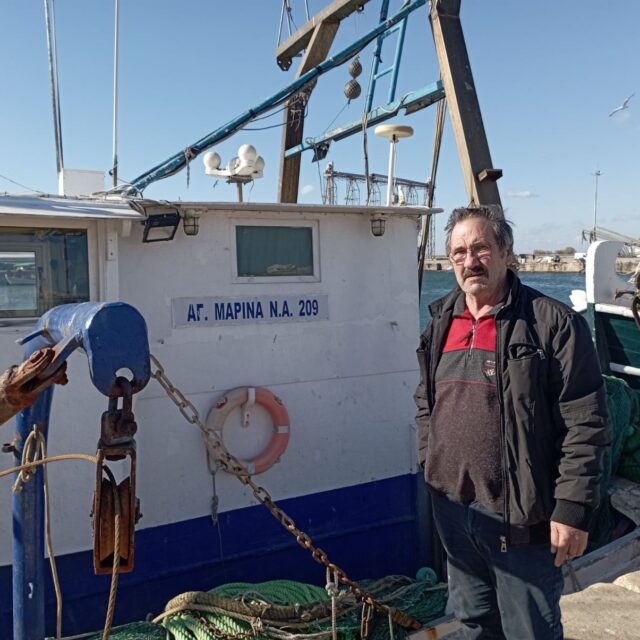
Kyriakos Gkavougiorgos
Mr. Kyriakos Gkavougiorgos, a member of the fishing community an important part of the “Fishing For Litter” project, talks about his professional story and his participation in the project. He sails in the Thracian Sea.
R: How many years have you worked as a fisherman? How did your occupation with fishing begin?
KG: I was born in Samothrace, a place with plenty of fishermen and I decided to work as a fisherman when I was 10 years old. In 1980 I bought my own boat and as years passed by I made some inshore fishing vessels. Until 2007 I was working on inshore fishing. In 2007 I bought my fishing trawler, while in the summers I kept working on inshore fishing.
R: Describe us a day at the sea.
KG: Our day starts at 03:00-03:30 am. We leave the port and check the weather, then we decide where we are about to head(as we say). Then we haul the nets, if the catch is okay we return to the port to send the fish to the fishmarket of Kavala. If the catch is not enough and the weather is okay, we keep on fishing during the night and return to the port in the afternoon.
R: What differences do you notice in the amount of marine litter compared to the past?
KG: I think that litter has increased compared to the past. It should be noted that there are so many pots for octopuses and that’s because most fishermen leave them at the sea during the forbidden season. Moreover, we observe a great amount of litter from Turkish purse seines.
R: What is the strangest type of litter you have removed from the sea?
KG: Once we caught a cow.
R: What does the sea mean to you and what does its protection?
KG: The sea is my life. Everyday she keeps “pulling” me close to her. As long as we protect her, the sea will keep on offering us her goods.
R: What is the message you would like to pass along the world?
KG: Love the sea and keep it clean.
iSea’s «Fishing For Litter» project is implemented for 6 years in a row, in lots of different areas in Greece, in collaboration with the A C Laskaridis Charitable Foundation. The ambassadors of this project, the professional fishers who actively support the effort of collecting and recording marine litter from the sea all over the country, talk about the nature of their job and share their experience and thoughts about the project.
We would like to thank all the fishers who cooperated with us, for a more effective implementation of the “Fishing For Litter” project and give a personal touch to this effort.

Thanasis Ladopoulos
Mr Thanasis Ladopoulos is one out of 35 fishermen that are part of the “Fishing for Litter” program that takes action in Northestern Aegean, especially in Lemnos.
R: How many years have you worked as a fisherman? How did your occupation with fishing begin?
TL: I’ve been fishing for 22 years. My father was a third generation fisherman and incited me to become a fisherman.
R: Could you describe a day in the sea?
TL: Captain’s life is lonely and monotonous. The greatest disadvantage of our work is that it is dangerous and often unfruitful. Every day is different. Some days are hard and frustrating and you want to give up and some days you are proud that you made it.
R: What differences do you notice regarding the amount of waste compared to the past?
TL: The amount of litter has increased compared to the past.
R: What kind of waste you’ve collected has made the biggest impression on you?
TL: I wouldn’t say that we haven’t removed something strange. We usually remove anything that people use.
R: What does the sea and its protection mean to you?
TL: I was born in Lemnos, and that’s the reason why the sea is an integral part of me. I can’t imagine my life without being near the sea. Its protection is inextricably connected to the future of our work.
R: What is the message you want to pass along the world?
TL: Keep the sea clean and support Greek producers.
Sea’s «Fishing For Litter» program is implemented for 6 years in a row, in lots of different areas in Greece, in collaboration with the A C Laskaridis Charitable Foundation. The ambassadors of this program, the professional fishermen who actively support the effort of collecting and recording aquatic litter from the sea all over the country, talk about the nature of their profession and share their experience and thoughts about the program.
We would like to thank all the fishermen who cooperated with us, for a more effective implementation of the “Fishing For Litter” program and give a personal touch to this effort.
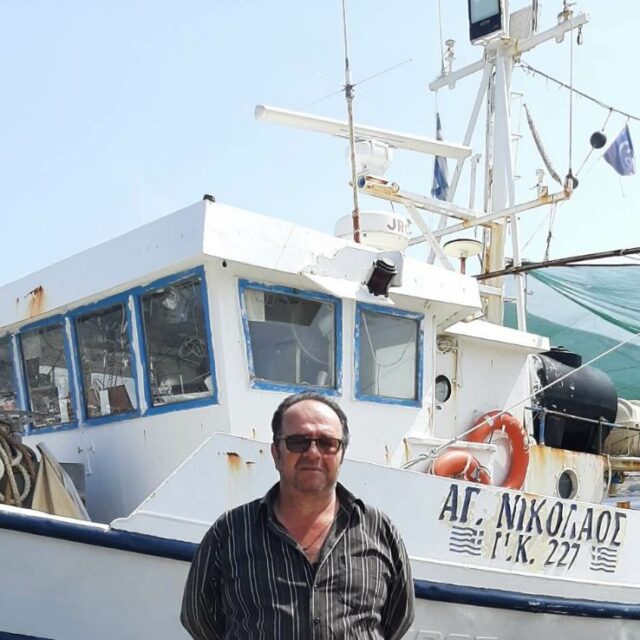
Stelios Savvas
Mr. Stelios Savvas is one of the fishers that are part of the “Fishing for Litter” program that takes action in the Eastern Aegean. He’s 55 years old and he professionally started to be involved in fishing in 2000. He’s working in Symi, Kalymnos, Kos and Samos.
R: How many years have you worked as a fisheran? How did your occupation with fishing begin?
SS: We have been involved in medium fishing as a family since 2000 when we acquired our boat. But the main motivator, for me and my siblings, was our father, who was professionally engaged in other branches of fishing.
R: We would like you to describe us a day at sea!
SS: We usually start work early in the morning, knowing in advance the weather conditions and thus we also know in advance the day the ship will come to send our fish to the central market in Piraeus. If the weather is good the boat works 24 hours a day.
R: What differences do you notice regarding the amount of litter in the sea compared to the past?
SS: The biggest difference that I notice, both myself and most fishermen in our area, is that in the past there was a lot of litter but smaller, today we are picking up bigger pieces of litter and mainly plastic boats in our area from immigrants, which if not picked up, cover a large surface of the seabed and of course you can reflect on the harm it brings.
R: What is the strangest type of litter you have removed from the sea?
SS: I wouldn’t say strange, given the facts of our region. We have collected boats, naval mines, shells, and bomb remnants.
R: What does the sea and its protection mean to you?
SS: The sea for us, as for every fisherman, is our home.
R: We want and need it clean. With the fishing for litter program we were given the opportunity to show the world what is in the sea and that only we with our wind trawlers can retrieve. In our country there is also an area designated as Posidonia which, after all, only we with the wind trawlers respect.
SS: What is the message you would like to pass along the world?
R: Respect for the sea and respect for what we all want to enjoy. No trash in the sea from anyone.
iSea’s «Fishing For Litter» project is implemented for 6 years in a row, in lots of different areas in Greece, in collaboration with the A C Laskaridis Charitable Foundation. The ambassadors of this project, the professional fishers who actively support the effort of collecting and recording marine litter from the sea all over the country, talk about the nature of their job and share their experience and thoughts about the project.
We would like to thank all the fishers who cooperated with us, for a more effective implementation of the “Fishing For Litter” project and give a personal touch to this effort.
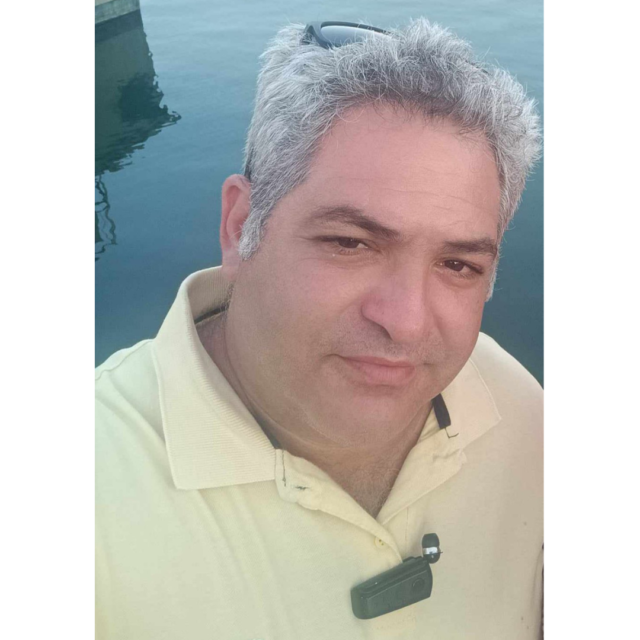
Alexandros Melekos
Mr Alexandros Melekos is of the fishers that are part of the “Fishing for Litter” program that takes action in the Central Aegean near to Chios island.
R: How many years have you worked as a fisheran? How did your occupation with fishing begin?
AM: I’ve been working as a fisherman since 1991. At that time, I was 15 years old and it was my father’s job.
R: Could you describe a day in the sea?
ΑΜ: There is monotony in our job, for us it’s the same procedure almost every day. Starting really early in the mornings at 3.00 am, leaving the port, choosing the area that we want to go depends on the season we are fishing. The day goes on like that until the night when we return back to port to give our fishes to the fish market.
R: What differences do you notice regarding the amount of waste compared to the past?
AM: Obviously today the amount of litter is much more compared to the past. We see a greater amount of waste in the areas that we don’t fish very often, but also in the areas that commercial and passenger ships pass through.
R: What kind of waste you’ve collected has made the biggest impression on you?
AM: A very important, in terms of national heritage, item. It was the Anchor that today adorns the surrounding area at the Central Port Authority of Chios, which according to the National Archaeological Service belonged to the flagship of Kara Ali that was set on fire by Konstantinos Kanaris in retaliation for the massacre in Chios.
R: What does the sea and its protection mean to you?
AM: The sea is a source of life. We live and we exist because of it. If we protect it, we will continue to live, to exist. We owe the sea our existence and we should protect it.
R: What is the message you want to pass along the world?
AM: Many people, especially in Greece, make their living from the sea. It nourishes us, as the older people here on the island used to say. If we don’t protect it then many of us will be unemployed and all of us will stop enjoying it in the summers.
iSea’s «Fishing For Litter» project is implemented for 6 years in a row, in lots of different areas in Greece, in collaboration with the A C Laskaridis Charitable Foundation. The ambassadors of this project, the professional fishers who actively support the effort of collecting and recording marine litter from the sea all over the country, talk about the nature of their job and share their experience and thoughts about the project.
We would like to thank all the fishers who cooperated with us, for a more effective implementation of the “Fishing For Litter” project and give a personal touch to this effort.

Emmanouil Kardamilas
Mr Emmanouil Kardamilas is one of the fishers that are part of the “Fishing for Litter” project that takes action in the North Aegean and more specifically in Thermaikos. He’s 45 years old and started his occupation with fishing by following his father’s work path.
R: How many years have you worked as a fisherman? How did your occupation with fishing begin?
EK: From October 1990, I took on my father’s percentage in the boat and started working together with my father’s two partners. After 8 years because of my second professional activity, I left the fishing boat up until 2022 when I finally bought the boat from the other two partners, I only did the general management of the boat. Now, I have a captain who works exclusively at the fishing boat.
R: What differences do you notice regarding the amount of waste compared to the past?
EK: I don’t have a clear picture because I am not on the boat anymore.
R: What kind of waste you’ve collected has made the biggest impression on you?
EK: A metal cart with a wire rope, with which they used to place the mines.
R: What does the sea and its protection mean to you?
EK: The sea is my life. Its protection should be a way of life and behavior for all humanity.
R: What is the message you want to pass along the world?
EK: If we all try a bit it’s easy to change things, to protect the sea.
iSea’s «Fishing For Litter» program is implemented for 6 years in a row, in lots of different areas in Greece, in collaboration with the A C Laskaridis Charitable Foundation. The ambassadors of this program, the professional fishermen who actively support the effort of collecting and recording aquatic litter from the sea all over the country, talk about the nature of their profession and share their experience and thoughts about the program.
We would like to thank all the fishermen who cooperated with us, for a more effective implementation of the “Fishing For Litter” program and give a personal touch to this effort.
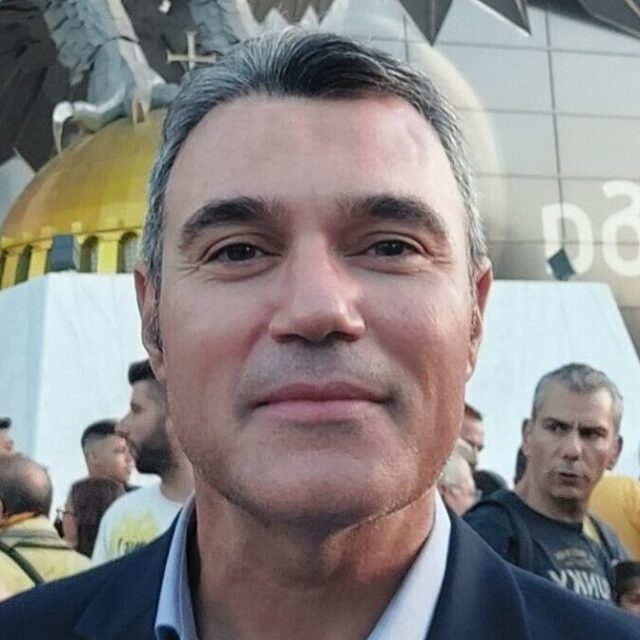
Georgios Voyatzoglou
Mr. Voyatzoglou Georgios is 47 years old and is the owner of 3 fishing boats, the fishing boats “Maria”, “Taxiarchis” and “Michalis” and all 3 contribute to the date collection from almost the entire Aegean, of litter within the program “Fishing for litter”.
His family is an old fishing family originally from the island of Chios, average 5 generations in the profession of average fishing. His story began when his great-grandfather built the first trawler and started fishing. He continued to work in the family business, following in his father’s footsteps and then taking over its “reins” himself, he decided to expand into the fish trade and thus moved to Piraeus, where he lives today.
He has also served in the past as the president of medium fishing professionals “The Aegean”.
R: How many years have you worked as a fisher? How did your occupation with fishing begin?
VG: It all started with my great-grandfather and today we count 5 generations engaged in the same profession. I am almost 32 years in this job, and I hope there will be a continuation from my son.
R: Could you describe a day in the sea?
VG: The feelings on board are mixed, good, and bad. The days are monotonous but also difficult especially when the weather is not good, or we cannot have a great amount of fish at the end of the day. Although today most of the boats are fully equipped with many facilities, compared to the past when the living conditions were very difficult especially during winter.
R: What differences do you notice regarding the amount of waste compared to the past?
VG: I have noticed a reduction of waste compared to the past when the project first started, but this only happens in areas where we often fish. In areas that are not fished the problem still exists and we see it when, depending on the season, we change sites or when we pass through areas where commercial ships have passed.
R: What kind of waste you’ve collected has made the biggest impression on you?
VG: Mainly what always impressed me was when barrels of fuel oil or paint containers, pierced our fishing nets. That was a double harm, they polluted the environment and piercing our nets.
R: What does the sea and its protection mean to you?
VG: The sea is my whole life, it has nurtured my whole family until today. Its protection is the protection of our lives. These two are closely connected for all those who live by the sea.
R: What is the message you want to pass along the world?
VG: I would like to urge the world and all housewives – mothers to teach their children to eat fish, and to love the sea, to protect it.
iSea’s «Fishing For Litter» program is implemented for 6 years in a row, in lots of different areas in Greece, in collaboration with the A C Laskaridis Charitable Foundation. The ambassadors of this program, the professional fishermen who actively support the effort of collecting and recording aquatic litter from the sea all over the country, talk about the nature of their profession and share their experience and thoughts about the program.
We would like to thank all the fishermen who cooperated with us, for a more effective implementation of the “Fishing For Litter” program and give a personal touch to this effort.
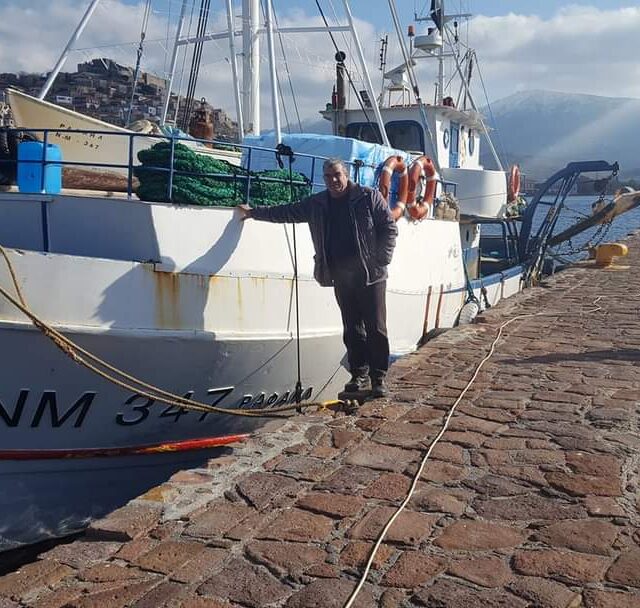
Grigoris Georgalas
Mr Grigoris Georgalas is one of the fishers that are part of the “Fishing for Litter” program that takes action in the North Aegean and more specifically around Lesvos island. He’s 64 years old and started his occupation with fishing by following his brother’s in-law family business.
R: How many years have you worked as a fisher? How did your occupation with fishing begin?
GG: My occupation with fishing started with a family business owned by my brother-in-law. I got into the boat when I was 12 years old. My love for the sea was so intense that I didn’t want to go to school.
R: Could you describe a day in the sea?
GG: We usually leave the port at 4 am and we always choose the fishing spot depending on the weather conditions. The day passes by slowly, usually calmly at the helm of the ship. We usually check our course and the amount of fish, we communicate with our family and late in the evening we approach the port again.
R: What differences do you notice regarding the amount of waste compared to the past?
GG: Since we have been participating in the “Fishing for Litter” program, I have noticed a slight decrease of the amount of waste, especially in the spots that fishers fish regularly. But the biggest problem is near the international roads, where there is a lot of waste.
R: What kind of waste you’ve collected has made the biggest impression on you?
GG: A while before the company joined the program I had recovered a large propeller from a steamboat, its wing was at least 2 meters long.
R: What does the sea and its protection mean to you?
GG: The protection of the sea is a very serious issue as well as the possible solutions given for it. Protecting the sea is protecting our very existence.
R: What is the message you want to pass along the world?
GG: I would like the Greek state to listen to us, to give priority to all of us who work at sea, to listen to the problems we face and try to find solutions along with us in order to protect the Greek seas.
iSea’s «Fishing For Litter» program is implemented for 6 years in a row, in lots of different areas in Greece, in collaboration with the A C Laskaridis Charitable Foundation. The ambassadors of this program, the professional fishermen who actively support the effort of collecting and recording aquatic litter from the sea all over the country, talk about the nature of their profession and share their experience and thoughts about the program.
We would like to thank all the fishermen who cooperated with us, for a more effective implementation of the “Fishing For Litter” program and give a personal touch to this effort.
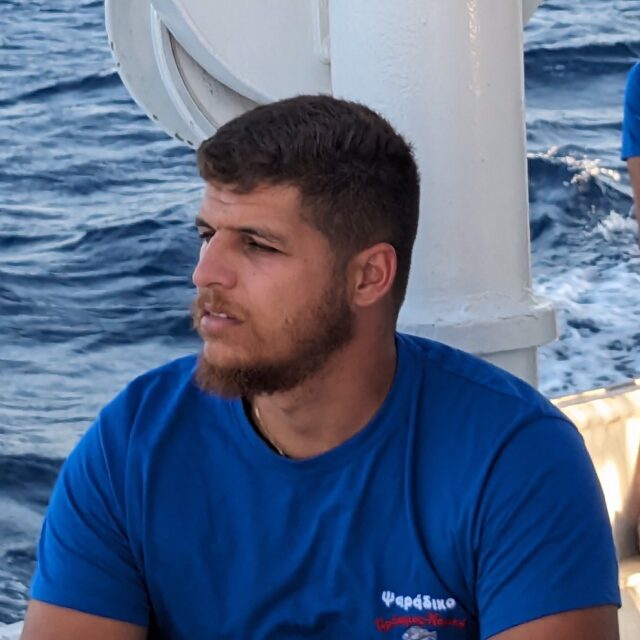
Pouliezos Sarantis
Mr Sarantis Pouliezos is one of the fishers that are part of the “Fishing for Litter” program that takes action near to Samos and Patmos island and. One of the youngest members of our program since he is only 28 years old, running his family business along with his father.
R: How many years have you worked as a fisherman? How did your occupation with fishing begin?
PS: Fishing is a family matter for us. It started with my grandfather here in Patmos and today we count the third generation of fishermen. Since I was a kid, I lived in the sea and in the trawler called “Gerasimos” just like my father. A second boat is currently being prepared.
R : Could you describe a day in the sea?
PS: We start late in the evening around midnight. Firstly, we check the weather conditions and of course the whole condition of the boat. After, the fishing process starts, and we usually go to the port every second or third day to send our fish to the central market of Piraeus.
R: What differences do you notice regarding the amount of waste compared to the past?
PS : Litter has been decreased significantly, but this only happens in the areas we fish frequently. In the places where we don’t fish often or in the places where commercial ships pass by, there is still a big problem that causes a lot of pollution to the marine environment and of course to our fishes.
R: What kind of waste you’ve collected has made the biggest impression on you?
PS: A large tractor tire, I was so impressed about how it ended up in the sea. For sure, someone threw it on purpose, there is no logical explanation for it to be where it was, it didn’t happen by accident.
R: What does the sea and its protection mean to you?
PS: The sea is my whole life. I live more in the sea than on land and in my house. Its’ protection is a duty and obligation for all of us.
R: What is the message you want to pass along the world?
PS: To respect the marine environment. The sea is not a big garbage can. I would like people to read our interviews and understand the position of the people who live and work in it. We don’t want a dirty house and neither do they.
iSea’s «Fishing For Litter» program is implemented for 6 years in a row, in lots of different areas in Greece, in collaboration with the A C Laskaridis Charitable Foundation. The ambassadors of this program, the professional fishermen who actively support the effort of collecting and recording aquatic litter from the sea all over the country, talk about the nature of their profession and share their experience and thoughts about the program.
We would like to thank all the fishermen who cooperated with us, for a more effective implementation of the “Fishing For Litter” program and give a personal touch to this effort.

Eleftherios Giannoukas
Giannoukas Eletherios is one of the youngest fishsermen that are part of the project, since he is only 25 years old. He takes action in the area of Dodecanese Sea with the two family owed trawlers ‘’Elefterios” and ‘’Asteri”.
R: How many years have you worked as a fisherman? How did your occupation with fishing begin?
G.E.: I have been involved in this business since I was very young, starting with my great-grandfather who first got involved in inshore fishery. Then in 1996, we bought the first trawler and after a while we bought the second one. Currently, I am responsible for one trawler and my father for the other.
R: Could you describe a day in the sea?
G.E.: We usually leave the port in the evening and after about an hour’s journey we throw our nets into the sea. Each boat trip lasts about 3 hours and this process is repeated until we return to the port every 2 or 3 days. Then we will send our fish to the central market of Piraeus. Life on a trawler is quite monotonous especially for a person my age. You can’t stand this job easily, if you don’t love the sea.
R: What differences do you notice regarding the amount of waste compared to the past?
G.E.: The amount of waste has been decreased considerably compared to the past and I believe this is partly due to the people who work on ships. Most of them are informed and have become ecologically conscious. Nevertheless, we encounter a lot of pollution in the areas where commercial ships pass or in places where we don’t fish often.
R: What kind of waste you’ve collected has made the biggest impression on you?
GE: Migrant boats and electrical appliances.
iSea’s «Fishing For Litter» program is implemented for 6 years in a row, in lots of different areas in Greece, in collaboration with the A C Laskaridis Charitable Foundation. The ambassadors of this program, the professional fishermen who actively support the effort of collecting and recording aquatic litter from the sea all over the country, talk about the nature of their profession and share their experience and thoughts about the program.
We would like to thank all the fishermen who cooperated with us, for a more effective implementation of the “Fishing For Litter” program and give a personal touch to this effort.

Nikolaos Kotsonis
Nikolaos Kotsonis is 50 years old and a cooperating member of the Fishing for Litter project together with his longtime partner Sambakoudakis, participating with 4 fishing boats “ARGO”, “ARGO II”, “ARGO III” ‘ and the ‘PANTOKRATOR’ where they fish all over the North Aegean and collect data for our project.
At the same time, together with Mr. Sambakoudakis, he is the owner of the company MSG GROUP (Mediterranean Sea Grown), based in Nea Michaniona, Thessaloniki, where both come from families with a long tradition in the middle sea fishing, and decided to establish a company for marketing and exporting their catches, equipping at the same time their boats with freeze-on-board technology.
R: How many years have you worked as a fisherman? How did your occupation with fishing begin?
K.N.: It all started by my grandfather 35 years ago and today we count 3 generations working in the same profession. The company’s first boat was purchased in 2006. I have been involved since I was a kid but I am actively fishing 25 years.
R: Could you describe a day in the sea?
K.N.: Days pass by monotonously for us on the boat and difficult when the weather is not good. Of course, nowadays the boats are fully equipped, providing many facilities compared to the past when the living conditions were very difficult, especially during the winter.
R: What differences do you notice regarding the amount of waste compared to the past?
K.N.: I notice a big reduction in waste compared to the past especially in relation to plastic waste, but this only happens in areas where we often pass by fishing. In areas that are not fished I believe the problem still exists and of course we cannot have an accurate picture.
R: What kind of waste you’ve collected has made the biggest impression on you?
K.N.: A long time ago, east of Lemnos we had recovered almost half a plane, several years have passed since then but I still remember it, it made a big impression on me.
R: What does the sea and its protection mean to you?
K.N.: The sea is everything for me, it is the source of my life, it is the beginning and the end. It’s protection is the protection of my life. It is the continuation of my professional activity, like many other people in Greece.
R: What is the message you want to pass along the world?
K.N.: I would like to tell everyone to love the sea, to help us protect it, not to pollute it, to keep it alive.
iSea’s «Fishing For Litter» project is implemented for 6 years in a row, in lots of different areas in Greece, in collaboration with the A C Laskaridis Charitable Foundation. The ambassadors of this project, the professional fishers who actively support the effort of collecting and recording marine litter from the sea all over the country, talk about the nature of their job and share their experience and thoughts about the project.
We would like to thank all the fishers who cooperated with us, for a more effective implementation of the “Fishing For Litter” project and give a personal touch to this effort.
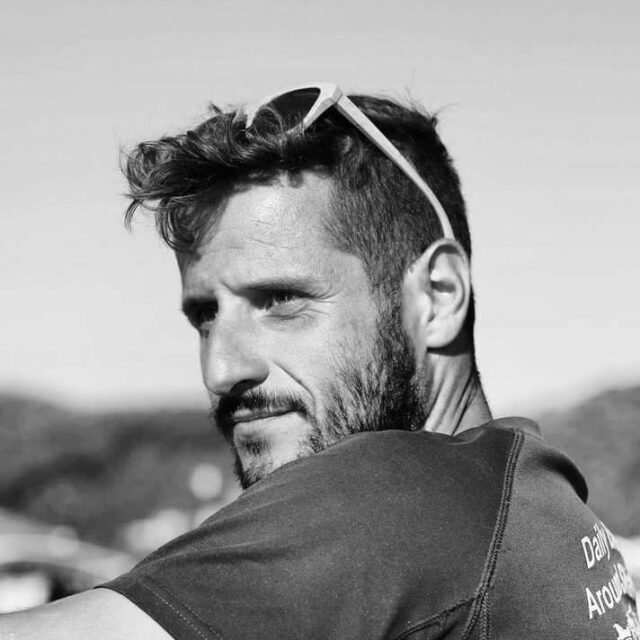
Dimitrios Gkiaourakis
Mr Giaourakis Dimitrios is 34 years old and one of the fishers that are part of the “Fishing for Litter” program. He takes action in the area of Magnisia and he started his occupation with fishing by following his father’s and grandfather’s family business.
R: How many years have you worked as a fisherman? How did your occupation with fishing begin?
G.D.: It all started in 1959 when my grandfather started working by chance as an engineer on a fishing vessel, then within 3 years he bought 50% of this vessel and later on, the other half. My father entered the workforce in 1988 when he decided to resign as a mechanical engineering professor at SELETE. I represent the third generation of the family business as I have been actively involved as a boat skipper for about 10 years, after completing my studies as a mechanical engineer and after completing my military duties.
R: Could you describe a day in the sea?
G.D.: We usually start at 5.00 a.m. from the port and after about an hour’s march, we cast the first kalada where it lasts about 5 hours and then the same process is repeated. Of course we have always checked the weather conditions and also the place we will fish from the beginning of our day. At some point in the late afternoon we return to the port to drop off our merchandise.
R: What differences do you notice regarding the amount of waste compared to the past?
G.D.: Since we have been participating in the “Fishing for Litter” project and based on the records that are being made, I have noticed a slight decrease, especially in the spots that are fished regularly. However, the problem with marine pollution still exists in the places where we don’t fish often as there is a large concentration of waste in the Pagasetic Gulf, a closed area for trawlers and according to studies the fish population is dying from this pollution.
R: What kind of waste you’ve collected has made the biggest impression on you?
G.D.: Once we caught a whole bathroom set, it was quite a tragic experience as I could never imagine seeing something like that. From time to time, of course, even now we fish refridgerators, kitchens, sinks.
R: What does the sea and its protection mean to you?
G.D.: The sea is my whole life. I grew up in it, live, work, almost all year round. Protecting it is our future, if we don’t protect it we will have no future.
R: What is the message you want to pass along the world?
GD: Most people don’t know about our profession, they don’t know what trawling is. They think we are the ones doing most of the harm to the marine environment. While this is not the case but the exact opposite since we fish legally and conscientiously outside the areas that have been designated as Natura. Beyond that, we also provide for the greek economy because of the employment opportunities we offer. Also, the are many professions are inextricably linked to our own profession. The state should protect us and listen to us, find a common way to protect our seas and the greek fish.
iSea’s «Fishing For Litter» project is implemented for 4 years in a row, in lots of different areas in Greece, in collaboration with the A C Laskaridis Charitable Foundation. The ambassadors of this project, the professional fishers who actively support the effort of collecting and recording marine litter from the sea all over the country, talk about the nature of their job and share their experience and thoughts about the project.
We would like to thank all the fishers who cooperated with us, for a more effective implementation of the “Fishing For Litter” project and give a personal touch to this effort.
iSea’s «Fishing For Litter» project is implemented for 6 years in a row, in lots of different areas in Greece, in collaboration with the A C Laskaridis Charitable Foundation. The ambassadors of this project, the professional fishers who actively support the effort of collecting and recording marine litter from the sea all over the country, talk about the nature of their job and share their experience and thoughts about the project.
We would like to thank all the fishers who cooperated with us, for a more effective implementation of the “Fishing For Litter” project and give a personal touch to this effort.
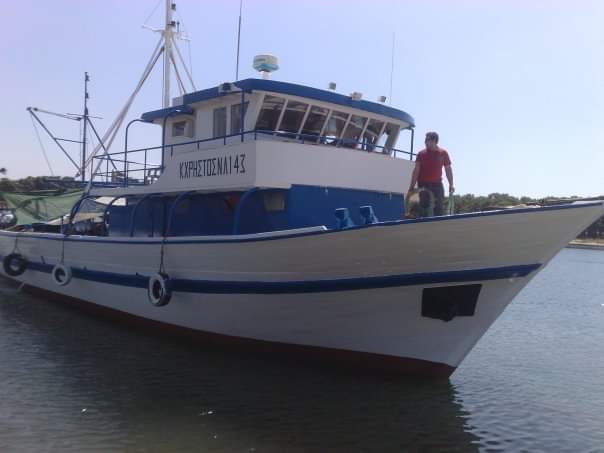
Konstantinos Karafillis
Konstantinos Karafillis is a fisherman that recently joined the “Fishing for Litter” project and he’s fishing along with his brother in the North Thracian Sea. He’s 36 years old and the fourth generation of fisherman in his family.
R: How many years have you worked as a fisherman? How did your occupation with fishing begin?
KK: I’m the 4th generation of fishermen in my family together with my brother, as you understand I belong to a fairly old fishing family. In the beginning we were involved in coastal fishing, but since 2006 and after a boat was bought, I have been involved in medium fishing.
R: Could you describe a day in the sea?
KK: Our day always starts once we get informed about the weather and choose the fishing spot, but now after checking the demand for fish in the market, something we didn’t particularly do in previous years. We usually fish around 4 to 6 baskets a day and return to the port to unload our fish, late in the afternoon.
R: What differences do you notice regarding the amount of waste compared to the past?
KK: Over the years, I’ve noticed that the waste that could potentially be thrown away by other fishing vessels has significantly decreased. But unfortunately we still have a big problem with single use plastics, plastic containers used for octopus traps as well as cement blocks.
R: What kind of waste you’ve collected has made the biggest impression on you?
KK: Probably, mine from some kind of warship.
R: What does the sea and its protection mean to you?
KK: The sea is a sweet germ, when I’m working, I keep wishing to go home, but as soon as the shift ends, I look at the sea and think about when I will go back to it. By protecting the sea, I feel like I’m protecting my future and of course the future of my children.
R: What is the message you want to pass along the world?
KK: There is only one thing I would like to convey to the world and that is: “Respect for the sea”. I think this message includes everything that I’d like to pass along and of course its protection and especially by us who make a living from it. After all, this was one of the reasons I decided to participate in the “Fishing for Litter” project of the Laskaridis Foundation in collaboration with iSea.
iSea’s «Fishing For Litter» project is implemented for 6 years in a row, in lots of different areas in Greece, in collaboration with the A C Laskaridis Charitable Foundation. The ambassadors of this project, the professional fishers who actively support the effort of collecting and recording marine litter from the sea all over the country, talk about the nature of their job and share their experience and thoughts about the project.
We would like to thank all the fishers who cooperated with us, for a more effective implementation of the “Fishing For Litter” project and give a personal touch to this effort.
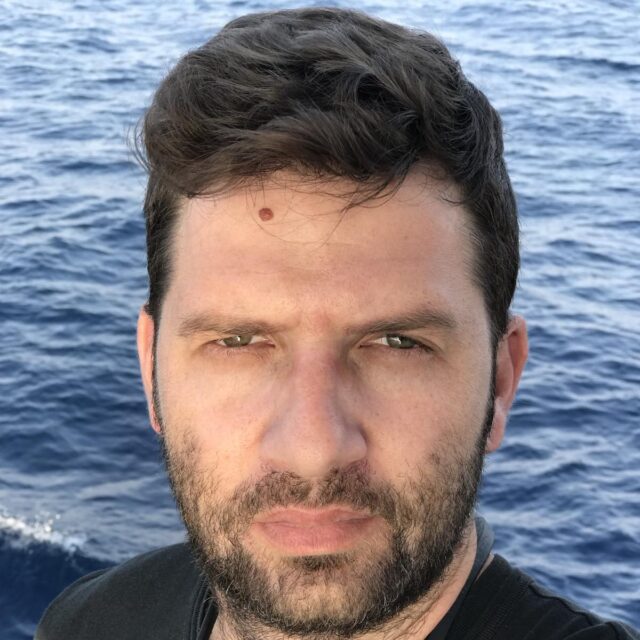
Parasxos Karabourniotis
Parasxos Karabourniotis is one of the fishers that are part of the “Fishing for Litter” project that takes action near to Chios, Psara, Tinos and Mykonos island. He is 37 years old, running his family business along with his father Mr Dimitrios Karabournotis. His family’s story with fishing began when his great-grand father came to Greece from Asia Minor and settled down to Chios island.
R: How many years have you worked as a fisherman? How did your occupation with fishing begin?
PK: I have been professionally involved in fishing for 19 years, but in fact the story begins much earlier when my great-grandfather came from Asia Minor to the island of Chios, settled and continued the profession he knew how to do best. Somehow the family business passed to my father Dimitrios Karabourniotis and finally to me.
R: Could you describe a day in the sea?
PK: We usually spend around 24 hours in the sea before going to the port to send the fish. Our work is a routine for us, a habit. All the above apply whenever the weather conditions are good and there are no storms.
R: What differences do you notice regarding the amount of waste compared to the past?
PK: I haven’t noticed anything different in the last 5 years. We are aware that we’ll find most litter while following large commercial ship routes. We’re also aware that we’ll find much less litter in routes where commercial ships do not sail. Sadly, the quantities of catches are constantly decreasing.
R: What kind of waste you’ve collected has made the biggest impression on you?
PK: Many things have impressed me such as the time we found a whole car, a torpedo, a huge old anchor. These are some of the objects I recall finding.
R: What does the sea and its protection mean to you?
PK: Great question! I have a love-hate relationship with the sea. In the past, when the profession’s conditions were better, I didn’t mind to go back to the port. Now, things have changed. However, I still enjoy being around it, even just by taking a boat ride in my small vessel. I can’t stand being away for too long. Its protection is vital, especially for the people that make a living out of fishing. No fisherman wants to cast his nets and fish litter, but even so, through the “Fishing for Litter” project, we help to keep it as clean as possible.
R: What is the message you want to pass along to the world?
PK: Our profession’s conditions are not as easy as many people might think. The conditions and hours are different compared to jobs on the shore. I advise everyone to respect the sea and take care of it, because it feels like home. I wish there was more intensive control so that we could find better solutions.
iSea’s «Fishing For Litter» project is implemented for 6 years in a row, in lots of different areas in Greece, in collaboration with the A C Laskaridis Charitable Foundation. The ambassadors of this project, the professional fishers who actively support the effort of collecting and recording marine litter from the sea all over the country, talk about the nature of their job and share their experience and thoughts about the project.
We would like to thank all the fishers who cooperated with us, for a more effective implementation of the “Fishing For Litter” project and give a personal touch to this effort.
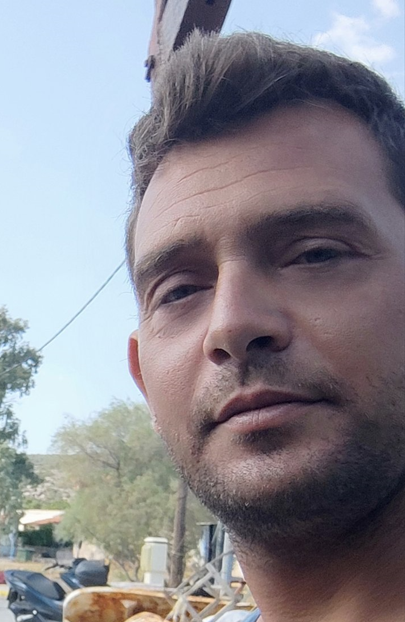
Stavros Gylikos
Mr Gilikos Stavros is a member of the “Fishing for Litter” project and takes action near to Lesvos. He is 36 years old and belongs to the third generation of his family that continues professionally fishing with a trawler, just like his father and grand farther.
R: How many years have you worked as a fisher? How did your occupation with fishing begin?
GS I have been a fisher since 2009. I was lucky enough to grow up in a fishing family. Both my grandfathers and my father were fishers, so I took over the business.
R: Could you describe a day in the sea?
GS: Usually our work starts at dawn, and depending on the season and weather, we start fishing, after choosing the fishing spot. When the weather conditions are bad, you have to be alert and the job is harder.
R: What differences do you notice regarding the amount of waste compared to the past?
GS: I have been at sea for a long time, and I think it’s safe to say that I see a stability in the recent years regarding the amount and type of litter. We’re all aware that if sail west, we’ll find tins, paint cans, plastic bottles and fishing nets. We found lots of litter during the immigrant influx, such as their personal belongings and parts of boats.
R: What kind of waste you’ve collected has made the biggest impression on you?
GS: I’ve always noticed that after the end of summer, we collected clothes from tourists, that always made a big impression on me. The strangest piece of litter we’ve found, however, was a F16 that crashed and sunk in our area in 1996.
R: What does the sea and its protection mean to you?
GS: The sea means everything to me. The sea and my boat are my whole life, the things that make me feel proud. The protection of the sea is my primary goal and that’s the reason I wanted to participate in the ‘’Fishing for litter” project. We all must help, since fishing boats are not enough.
R: What is the message you want to pass along the world?
GS: The sea is for everyone! Everyone should enjoy it but also protect it. As a fisher, it’s not only my workplace, but it is also home. The environment we live for an entire day or even more. We want a clean sea and a stable industry.
iSea’s «Fishing For Litter» project is implemented for 6 years in a row, in lots of different areas in Greece, in collaboration with the A C Laskaridis Charitable Foundation. The ambassadors of this project, the professional fishers who actively support the effort of collecting and recording marine litter from the sea all over the country, talk about the nature of their job and share their experience and thoughts about the project.
We would like to thank all the fishers who cooperated with us, for a more effective implementation of the “Fishing For Litter” project and give a personal touch to this effort.
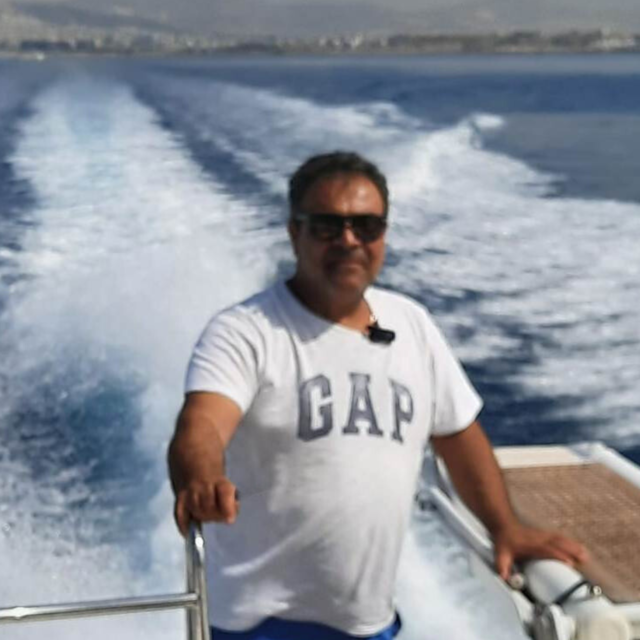
Georgios Hohlakis
Georgios Hohlakis is 51 years old, he lives in Crete, he’s working as a fisher for 35 years and owns a trawler along with his family.
He is a part of the “Fishing for Litter” project that takes action in the Gulf of Chania which is in the bay of the Cretan Sea in Northwestern Crete.
R: How many years have you worked as a fisher? How did your occupation with fishing begin?
GH : I have been fishing for 35 years. I started from inshore fishing and 15 years ago I started my business with our trawler “Konstantinos”.
R: Could you describe a day in the sea?
GH: The day begins by taking out the fish at 4 am. Then, we depart to start fishing and decide on the place we’ll travel to. Usually, during the winter months, we haul the nets twice, until it gets dark and then, always depending on the location we are, we might haul them 2 or 3 more times.
R: What differences do you notice regarding the amount of waste compared to the past?
GH: I have noticed that the amount of waste is bigger than the previous years, even though we’ve collected large amounts of.
R: What kind of waste you’ve collected has made the biggest impression on you?
GH : The strangest thing was a large garbage bin.
R: What does the sea and its protection mean to you?
GH: Sea means life and its protection is our main concern.
R: What is the message you want to pass along the world?
GH:To take care of the sea, it’s not a big garbage dump. We should also respect the environment in general. Another very important thing is to stop overfishing.
iSea’s «Fishing For Litter» project is implemented for 6 years in a row, in lots of different areas in Greece, in collaboration with the A C Laskaridis Charitable Foundation. The ambassadors of this project, the professional fishers who actively support the effort of collecting and recording marine litter from the sea all over the country, talk about the nature of their job and share their experience and thoughts about the project.
We would like to thank all the fishers who cooperated with us, for a more effective implementation of the “Fishing For Litter” project and give a personal touch to this effort.
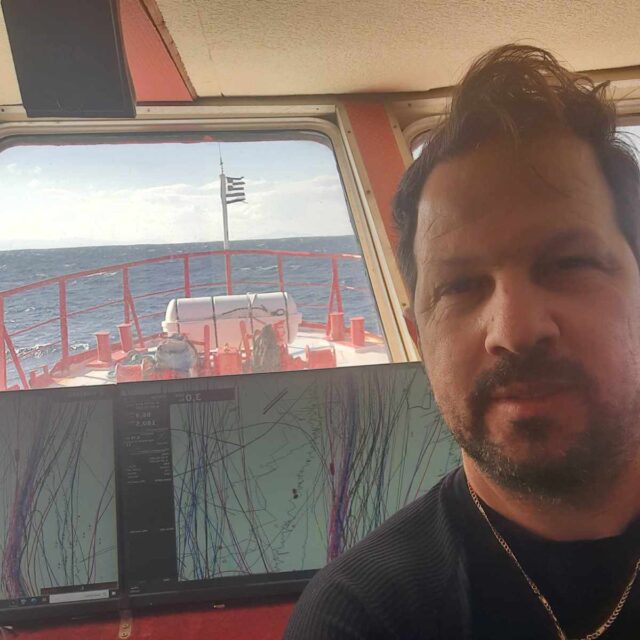
Michail Tsampas
Mr. Michael Tsambas is one of the fishers of the project and operates in the Ionian region. He is 46 years old and has been professionally involved in fishing since 1992, following the family business that passed down from generation to generation.
R: How many years have you worked as a fisher? How did your occupation with fishing begin?
MT: Since 1992. Fishing started as a family business that passed down from generation to generation.
R: Could you describe a day in the sea?
MT: It is a way of life and I feel as comfortable as I am at home.
R: What differences do you notice regarding the amount of waste compared to the past?
MT: In terms of quantity, it is the same, but now we pay much more attention to it than before.
R: What kind of waste you’ve collected has made the biggest impression on you?
MT: The strangest waste is umbrellas and chairs from beaches.
R: What does the sea and its protection mean to you?
MT: The sea is family, and its protection, we are trying our best, because we live from the sea.
R: What is the message you want to pass along the world?
MT: They should not pollute the sea because we all live from the sea, and above all our children.
iSea’s «Fishing For Litter» project is implemented for 6 years in a row, in lots of different areas in Greece, in collaboration with the A C Laskaridis Charitable Foundation. The ambassadors of this project, the professional fishers who actively support the effort of collecting and recording marine litter from the sea all over the country, talk about the nature of their job and share their experience and thoughts about the project.
We would like to thank all the fishers who cooperated with us, for a more effective implementation of the “Fishing For Litter” project and give a personal touch to this effort.
Nikolaos Alexiadis
Mr Nikos Alexiadis is one of the new fishers that is part of the “Fishing for Litter” program and takes action in Thermaikos Gulf. He’s 28 years old and started he’s occupation with fishing by following his father and his grandfather.
R: How many years have you worked as a fisher? How did your occupation with fishing begin?
NA: I have been professionally involved in fishing and bottom trawling for about 7 years. However, my family’s involvement in fishing goes back 4 generations, when my great-grandfather, coming to Greece from Asia Minor, bought the first fishing boat in Michaniona, Thessaloniki.
R: Could you describe a day in the sea?
NA: We usually leave the port at dawn, choosing the fishing spot always depending on the weather conditions. The day usually flows calmly, on the ship you don’t have many choices after all, you feel cut off and trapped, especially for a person in my age, and many times you feel that it holds you back in other parts of your life. Life at sea is routine, we look at the course, the quantity of fish, a good catch will make us happy and a difficult day will make us sad.
R: What differences do you notice regarding the amount of waste compared to the past?
NA: I have the feeling that in the areas where we fish, the waste has decreased, compared to the past, but I know very well that in the places where we do not fish, unfortunately the situation is tragic. I also notice that the waste is almost 90% is plastic, and we no longer easily find litter that would come from fishing activity.
R: What kind of waste you’ve collected has made the biggest impression on you?
NA: What made a big impression on me was when we found a cannon base years ago.
R: What does the sea and its protection mean to you?
NA:The sea for all fishers means just one thing, Life. The protection of the sea is important for all of us and for the fishers to be able to have a future, and perhaps if it will be done correctly, I will not be the last one in my family to engage in the profession of fishing.
R: What is the message you want to pass along to the world?
NA: I would like the Greek state to listen to us, to give priority by taking protective
measures for fish stocks, measures to protect the sea, and proper working hours
with favorable conditions, especially for younger people.
iSea’s «Fishing For Litter» project is implemented for 6 years in a row, in lots of different areas in Greece, in collaboration with the A C Laskaridis Charitable Foundation. The ambassadors of this project, the professional fishers who actively support the effort of collecting and recording marine litter from the sea all over the country, talk about the nature of their job and share their experience and thoughts about the project.
We would like to thank all the fishers who cooperated with us, for a more effective implementation of the “Fishing For Litter” project and give a personal touch to this effort.
Giorgos Psarros
Mr George Psarros is one of the new members of the “Fishing for Litter” project and takes action in Thracian Sea and East Aegean. He’s 55 years old and started he’s occupation with fishing by following his father and his grandfather.
R: How many years have you worked as a fisher? How did your occupation with fishing begin?
GP: I am a professional fisher for 35 years. I started and essentially followed my
father’s profession, who he first started in Michaniona, Thessaloniki with our first boat following his father as well.
R: Could you describe a day in the sea?
GP: The fishing spot is chosen, in the past this was done empirically, today there are
machines that help us with this. We leave the port at dawn. After a 3-hour journey, our first fishing attempt will take place. At the end of the day, we will return to the port and send our fish to the fish market. I did not follow this particular profession by choice, but in those years you usually continued the family profession, which is how I did it too. The truth is that our job is very difficult, as you grow older you feel more and more nostalgic. For your family, but also for the moments you missed with them.
R: What differences do you notice regarding the amount of waste compared to the past?
GP: Compared to the past, litters were usually from metal, now we constantly see
plastic, mainly bags and bottles. Unfortunately, plastic dominates.
R: What kind of waste you’ve collected has made the biggest impression on you?
GP: GP: I wouldn’t say that I was surprised by anything, but I can tell you that it saddens me a lot when I find metal paint cans or barrels from the engine rooms of large commercial ships with burnt oil in my nets. They cause enormous pollution and of course destroy our fish.
R: What does the sea and its protection mean to you?
GP: For me, the sea is a means of livelihood, but at the same time it is also that for
all Greeks. A Greek cannot live without the sea. Especially for those who grew up near it. Its protection is intertwined with our economic prosperity, for my own profession among others.
R: What is the message you want to pass along to the world?
GP: We must protect the sea, because it is our future, in a country like Greece and a
source of life for all of us.
iSea’s «Fishing For Litter» project is implemented for 6 years in a row, in lots of different areas in Greece, in collaboration with the A C Laskaridis Charitable Foundation. The ambassadors of this project, the professional fishers who actively support the effort of collecting and recording marine litter from the sea all over the country, talk about the nature of their job and share their experience and thoughts about the project.
We would like to thank all the fishers who cooperated with us, for a more effective implementation of the “Fishing For Litter” project and give a personal touch to this effort.
Funders

